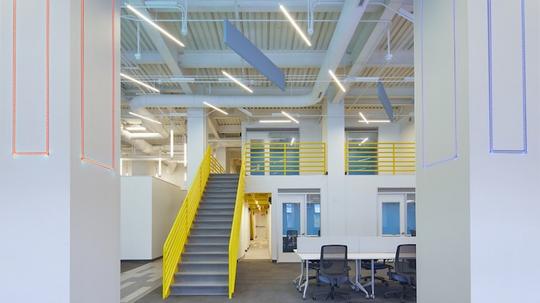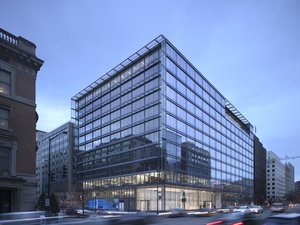
Only three months after launching its new space on Georgia Ave, the Inclusive Innovation Incubator, a space designed to support minority entrepreneurs and entrepreneurs with plans to support underserved communities, is now facing violations from the city — challenging the idea of its inclusiveness.
The incubator, or In3, received nearly $1 million in grant funding from the Mayor Muriel Bowser's office, and, according to the District's Office of Disability Rights, anyone who receives government funds must meet The American with Disabilities Act's Title III regulations — which specifies requirements for public spaces such as offices, movie theaters, restaurants and schools — to make sure their space is accessible.
According to a D.C. Office of Disability Rights report sent to DC Inno, there are a number of violations including:
- Front doors that lack an automatic door opening mechanism,
- A kitchen that requires you to go down two steps that are too tall for wheelchair use,
- Kitchen cabinets that are too tall,
- Restroom signs that lack Braille translations,
- Staircases that lack handrail extensions,
- and more.
Concerns regarding the space and its development were brought to the attention of the Office of Disability Rights by a group of concerned disabled entrepreneurs in the D.C metro area. The group documented places in the space they were concerned about and spoke with the office several times to have a report conducted.
In an email on July 19, Office of Disability Rights spokeswoman Beatrice Schmidt said a grantee's space can be reviewed at anytime during the development process to make sure they're complying with the ADA's Title III regulations.
The report sent to DC Inno was filed on April 11 to the Office of the Deputy Mayor for Planning and Economic Development, the mayoral office working closest with In3. The incubator opened its doors to the public about a week later on April 17.
As is normal, The Office of Disability Rights suggested a few solutions to the violations in its report, such as placing a staff member near the front doors to assist disabled visitors or placing a bookshelf under low-handing, wall-mounted television sets.
Both the Mayor's office and Aaron Saunders, CEO of Clearly Innovative, the parent company of the incubator's operator, Luma Lab, could not be reached for comment before publication after several attempts.
In3 — a space focused on attracting minority entrepreneurs or entrepreneurs planning to serve underrepresented communities — is the brainchild of Howard University and the Office of the Deputy Mayor for Planning & Economic Development, which later brought on Luma Lab as its operator. Howard provided the space, and the office provided some of the construction funds. In March 2016, construction for the space broke ground, and over a year later, the incubator opened to the public.
Diego Masical, a disabled entrepreneur who is a part of the group that raised the issue, said that the Office of the Deputy Mayor for Planning and Economic Development has been in constant email talks with the group on plans to renovate and upgrade the space, with one email stating the office had recently spoke with the architecture team.
Wingate Hughes Architects, the firm that built up the space, said they are involved in the current plans but declined to comment further.
Schmidt also confirmed that In3 has plans to renovate and update the space, and her office does not have another inspection planned right now. It's unclear how much renovations could cost or what the projected timeline for the upgrades looks like.
The incubator's violations were reported by members of the disabled community in the D.C. area. Schmidt said, in the same email, that this is normal for the office.
"ODR can receive inquiries about buildings that are not ADA compliant at any time," she said. "As such, we do receive these inquiries from members of the public or from government agencies requesting an accessibility evaluation."
Masical told DC Inno that he and other disabled entrepreneurs have been working with other District agencies successfully to promote the ecosystem, including the launch of the Disability Start Up Network, backed by the Department of Small and Local Business Development, which hosts monthly meetings to discuss support for business owners and aspiring business owners with a disability in the District. The next meeting is Monday.
Schmidt said there is no specific length of time for when the building is required to comply with the ADA. "The legal standard is a reasonable period of time," she wrote in an email.
"The courts may impose civil penalties in cases brought by the Justice Department involving violations that are substantial and/or continuous in nature. As such, businesses should demonstrate a good faith effort to comply with the ADA."




